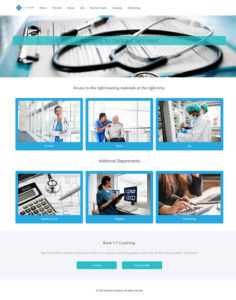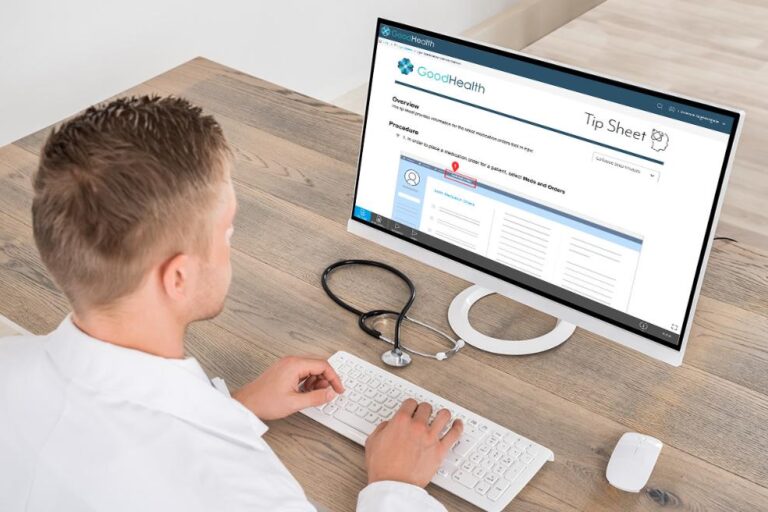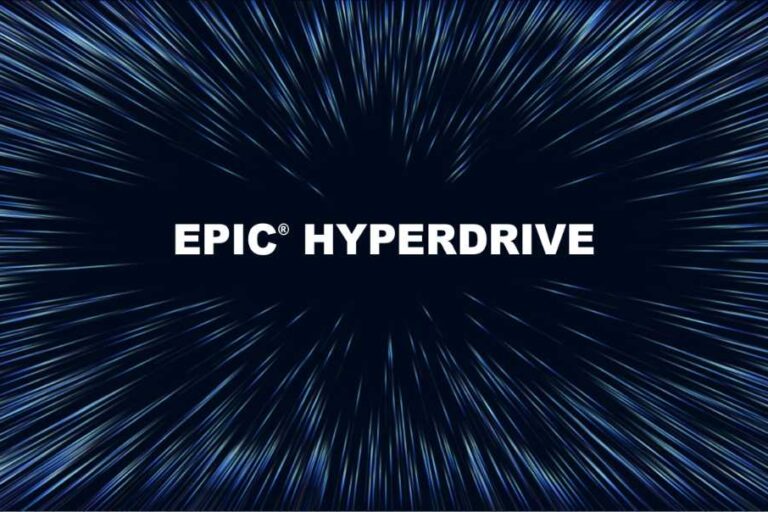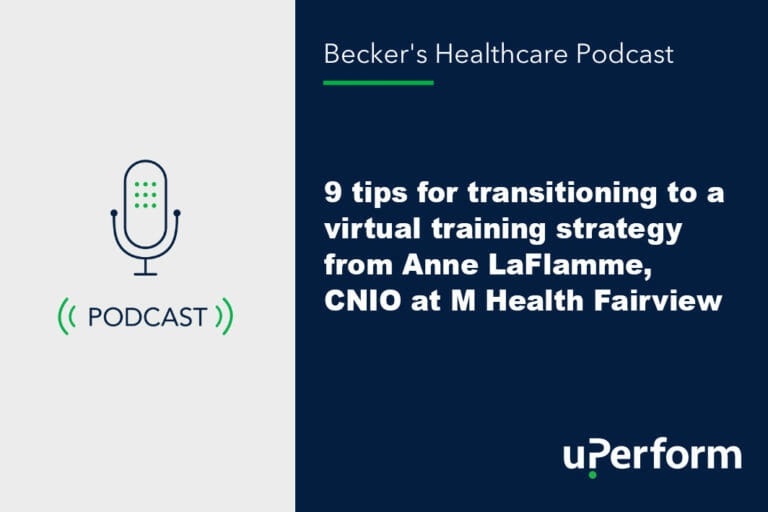Looking for ways to get new hires through Epic onboarding faster? As resource-strapped health systems race to onboard an influx of new hires, learning applications like uPerform offer a streamlined solution for creating and delivering a personalized onboarding experience that saves time and supports users along their entire Epic journey.
Supported by uPerform, leading health systems are scaling Epic onboarding to meet growing demands, onboarding new hires and getting them on the floor faster and improving the overall Epic training experience for clinicians.
Epic onboarding: A self-directed strategy
Many health systems are struggling to maintain and scale traditional Epic onboarding programs. As turnover soars and profit margins shrink, training teams are having to find ways to do more with less. A virtual, self-directed Epic onboarding strategy helps by reducing the time both trainers and trainees spend in the classroom and offering a more scalable solution.
With uPerform, new hires gain access to Epic onboarding materials before their first day on the job. They then work through basic Epic onboarding courses or microlearning content, providing them with a baseline knowledge of their new employer’s Epic instance prior to receiving their Epic login.
This saves both new hires and trainers valuable time. New hires no longer need to sit through classroom instruction that may include irrelevant material or move at a slow pace to accommodate all learners. Trainers can create content that can be delivered to an infinite number of new hires, rather than spending the majority of their time in classroom instruction. These time savings allow the organization to more easily scale Epic onboarding to meet the growing needs of the organization and deliver higher-value learning opportunities like one-on-one coaching and EHR personalization.
A self-directed Epic onboarding strategy doesn’t only save time, however. It often correlates with improved satisfaction with the overall training experience. Here’s Dr. CT Lin, CMIO at UCHealth, sharing his experience with traditional instructor-led training and how self-directed learning provided a solution.
Self-directed training strategies have also been shown to drive efficiency. A recent KLAS Research study found that self-directed eLearning saved clinicians more time per week in the EHR than any other training method. Clinicians saved an average of 91 minutes per week in the EHR, compared to just 72 minutes for in-person, one-on-one training and 33 minutes for classroom training.
Let’s look at how leading health systems are leveraging uPerform to deliver a self-directed Epic onboarding experience.
Gundersen Health System scales Epic onboarding amid organizational growth
A self-directed approach is a great way for organizations to scale Epic onboarding. When Gundersen Health System was experiencing rapid growth, its training team needed a way to rapidly onboard an increasing number of affiliate partners and new hires. Without the resources to add more training team members, Gundersen looked to a virtual, self-directed Epic onboarding strategy.
Gundersen’s training team created courses and simulations to rapidly onboard new hires. While the courses and simulations are self-directed, new hires complete their Epic onboarding in a computer lab staffed by a trainer. This allows trainers to answer any questions as they arise.
The strategy has allowed the training team to be in more places at once and scale their Epic onboarding to meet the growing demands of the organization.
“We found a great deal of efficiency with folks, because instead of having 15 trainers in 10 computer labs, we instead could have 2 or 3 trainers in different computer labs with many roles in those rooms taking the courses.”
— Bethany Poellinger
Prior to transitioning to a self-directed onboarding strategy, Gundersen’s training team was struggling to keep up with onboarding demands. New hires often had to wait up to five days to begin their Epic onboarding, preventing them from accessing Epic and caring for patients. Their new role-based, self-directed onboarding strategy has reduced the onboarding time for some roles from four days to just one day.
Tune into this Becker’s Healthcare Podcast featuring the Gundersen training team to learn more about how they’re scaling Epic onboarding with uPerform.
UCHealth onboard new hires in as little as 3 hours with self-paced training
Gundersen isn’t the only health system finding ways to reduce the overall time new hires spend in Epic onboarding. As UCHealth grew from a one hospital system with 5,000 employees to a more than 15 hospital system with over 30,000 employees, they needed a scalable solution for delivering Epic onboarding and training materials to end users. They opted to leverage uPerform to deliver learning opportunities to users at their fingertips.
UCHealth ‘blew apart’ its training program and is now onboarding Epic users in a fraction of the time.
“Then we have the uPerformself-paced learning [in Epic], which can be up to three hours. At the end of which, here’s your login. Go start taking care of patients. So, in as quick as about two hours, you’ve gone from ‘I need to get trained’ to ‘I can start taking care of patients.’”
– Dr. CT Lin, CMIO at UCHealth
It’s important to note that the initial three hours of self-paced Epic onboarding isn’t the only Epic training UCHealth clinicians receive. After completing initial onboarding, clinicians attend 30, 60, and 90-day follow-up trainings to address knowledge gaps and personalize their use of Epic.
The strategy has worked well for UCHealth, not only for its ability to onboard clinicians faster but also for satisfaction. Feedback from clinicians has been extremely positive, whereas according to Dr. CT Lin, “no one was ever happy with classroom training.”
Tune into this Becker’s Healthcare podcast to hear more from Dr. CT Lin on how UCHealth has overhauled its Epic training strategy.
M Health Fairview receives rave reviews on Learning Pathways
M Health Fairview is a 10-hospital health system that put uPerform at the front and center of its ‘learning solar system.’ When the health system was facing one of the largest nursing strikes in the nation, it worked with uPerform to develop a new onboarding tool – Learning Pathways.
The M Health Fairview training team created a combined course for 18 different nurse learning paths. They were able to onboard 1,500 nurses in only five days using the course and received “some of the best compliments on training that we’ve ever received from onboarding nurses,” according to Derek Harley, EHR/HIT Learning and Development Manager.
With Learning Pathways, training teams can create unique learning tracks, or pathways, to guide users through Epic training courses based on user role, location, specialty, project or use case. With clearly defined pathways available on demand, learners can easily find and complete relevant courses and assessments.
Post-onboarding: Supporting users with ongoing training in their workflow
Regardless of how good an onboarding strategy might be, it’s critical to support Epic users with ongoing training opportunities. With uPerform, clinicians can access training materials directly in their Epic workflow anytime, anywhere. This not only ensures that they find the help they need to complete important tasks and workflows, but it also improves their overall experience with Epic.
Users of uPerform at Baylor Scott & White Health (BSW) rate their Net EHR Experience Score (NEES) 12.9 points higher than non-users. The just-in-time delivery of training content has allowed BSW to manage their training requirements with limited trainers and resources, while providing end users with a better ongoing training experience.
Related Articles
Scale and improve Epic onboarding with uPerform
Looking for an Epic onboarding solution that enables you to scale training, keep up with onboarding demands and improve the overall Epic onboarding and training experience for users? uPerform is working with leading health systems around the nation and internationally to deliver the training that Epic users want and need to succeed.
Contact us to learn more about how uPerform can work for your organization.
Epic and Connection Hub are trademarks or registered trademarks of Epic Systems Corporation.












